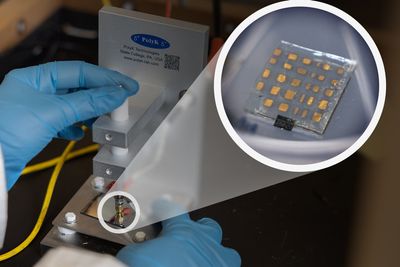deluxe capacitor
UH researchers contribute to promising energy storage technology

Researchers from the University of Houston, Jackson State University, and Howard University have created a new type of flexible high-energy-density capacitor, a device that stores energy. Photo via UH.edu
Storage is a major part of the energy system that's ripe for innovation and disruption — and a research team based partly out of the University of Houston has made a remarkable milestone in capacitor technology.
Researchers from the University of Houston, Jackson State University, and Howard University have created a new type of flexible high-energy-density capacitor, a device that stores energy. For now, the prototype is just 1-inch by 1-inch, but a larger version of the technology can highly impact industries that rely on energy storage or batteries.
The research team explained their project in a paper titled “Ultrahigh Capacitive Energy Density in Stratified 2D Nanofiller-Based Polymer Dielectric Films” published in the journal ACS Nano.
“High-energy and high-power capacitors are essential for a reliable power supply, especially as we shift to using more renewable energy sources," Alamgir Karim, Dow Chair and Welch Foundation Professor of Chemical Engineering at UH and faculty mentor on the team, says in a UH news release. "However, current dielectric capacitors don't store as much energy as other types of energy storage devices such as batteries. The higher power density of capacitors makes them more attractive for a multitude of applications as compared to batteries."
The unique design of the capacitor includes layering polymers with oriented 2D nanofillers — which create a material that's thinner than human hair. The design featured an improved energy storage performance with higher energy density and efficiency than existing technologies.
"Our work demonstrates the development of high energy and high-power density capacitors by blocking electrical breakdown pathways in polymeric materials using the oriented 2D nanofillers," adds Maninderjeet Singh, who earned a Ph.D. in chemical engineering at UH last year and is the first author on the paper along with Priyanka Das from Jackson State University. "We achieved an ultra-high energy density of approximately 75 J/cm³, the highest reported for a polymeric dielectric capacitor to date."
Once scaled, the technology has the potential to enhance energy storage in electronics, electric vehicles, power systems, and more.